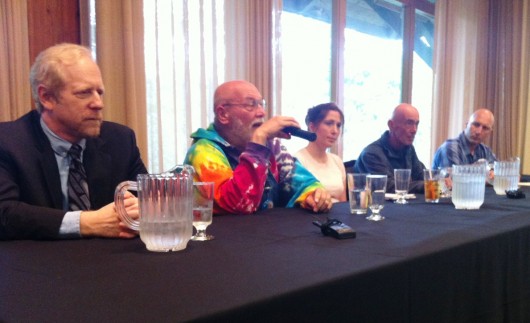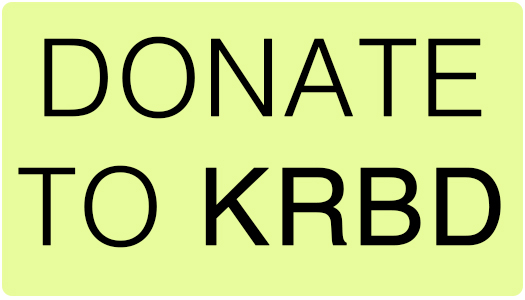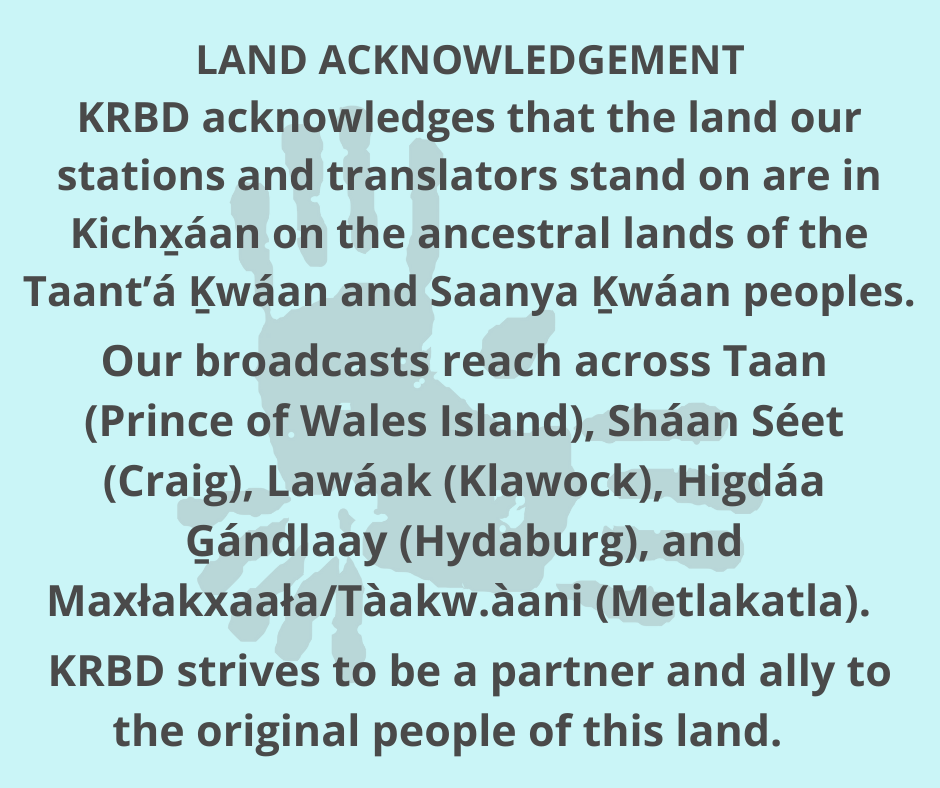
From left are Ketchikan City Council candidates Dave Kiffer, KJ Harris, Amanda Mitchell, Ed Plute and Kevin Staples. (Photo by Megan Petersen)
Five of the six candidates running for three Ketchikan City Council seats attended this week’s Ketchikan Chamber of Commerce lunch to introduce themselves and answer questions from the audience.
This election season, whenever candidates for state or local office have addressed the Ketchikan Chamber of Commerce, they are asked how they plan to vote on Proposition 2, the Nov. 4 ballot initiative that seeks to legalize and tax marijuana in the State of Alaska.
This forum was no different, but the audience did get more varied answers. Previously, only one candidate — Lewis Armey Jr., running for borough mayor – said he would vote yes. Of the City Council candidates, however, three said they’re voting yes, one is undecided and just one was a definite no.
Dave Kiffer is the current borough mayor running for City Council. He kicked off the answers to that question, and said he does not support the proposition for a simple reason: He has a teenage son.
“To me, what is the message we’re sending our teens if we turn around and say ‘Oh yeah, drugs are bad until you’re 21 or 19 or 18 or whatever the number is?’” he said. “I just don’t want to go there.”
Incumbent Council Member KJ Harris said he is still undecided, and would like to see how legalization works in Colorado and Washington State before making that change in Alaska.
“I’ve been smoking weed since I was 14 years old and I’m not afraid to admit it. But I’m not ready yet to make it legal,” he said. “I’m not real comfortable on – as it works out in America, we pass it, a few other states pass it and 20 years from now we got our president standing up there going (inhale) ‘Everything’s OK here, dudes!’”
Amanda Mitchell, Ed Plute and Kevin Staples all say they’re voting in favor of legalizing marijuana. Mitchell said kids have access to drugs whether or not marijuana is legal. She said it’s up to parents to educate their children.
Plute said it’s a matter of personal choice, and people shouldn’t go to jail for smoking something that grows naturally. Staples said that the U.S. has lost the war on drugs, and it’s time for a new approach.
Incumbent City Council Member Dick Coose is running for re-election. He did not attend the noon forum, but he has spoken strongly during past City Council meetings in favor of drug enforcement.
The five candidates also were asked about the City of Ketchikan’s two bond propositions, totaling $10 million. They would help pay for sewer and water pipes that badly need replacing.
Mitchell said she’d like to look at funding options. She gave an example of a community in Hawaii that got together to fix a road for a fraction of the estimated cost. Mitchell added that the city needs to look at ways to cut spending.
“I might want to go see a movie, but if I need to put gas into the vehicle, I’m going to put that gas in there,” she said. “And it doesn’t mean I’m going to take out debt or put it on the credit card to go to the movies. Sometimes we have to cut those niceties that we like so much.”
Staples had a suggestion for an area to cut: The city’s Museums Department, which operates the Tongass Historical Museum downtown and the Totem Heritage Center next to City Park.
“We are funding these two museums and nobody even knows about (them),” he said. “I went into one. I used the head and went back outside again. It took me probably 30 seconds to see the whole place. I’m not against the museum, but if we don’t have enough money to keep the sewage from floating up in my yard but we have enough money for two museums, something’s not right.”
Kiffer and Harris say that the bonds are important to pay for that infrastructure need. Harris added that the bonds will allow the city to qualify for a state program that will reimburse 70 percent of the project costs.
Plute said the city has too much debt, and he opposes the bond proposition.
Energy was a big topic of interest at the Chamber event. One audience member asked about the potential for alternative forms of renewable energy, such as wind.
Kiffer said the federal government has done studies that indicate Ketchikan doesn’t have adequate sustained wind, although it’s something that could be explored.
Harris said wind and tidal generators, just like hydropower, all would cost money to build and operate. Mitchell notes that there are potential grants and other programs that she would be willing to investigate.
Plute agrees with Mitchell and said the federal government provides grants through a clean energy incentive program.
“You put three of them giant generators up on Deer Mountain. There ain’t that many birds flying around up there or deer jumping so high they’ll get chopped in half,” he said. “And it’s a clean source and it’s really easy to work with and it’s feasible. This is one thing we need to look at, but it’s the future we’re looking at, also.”
Staples said Ketchikan is the rain capital of the world, and should continue to explore more hydroelectric dam projects to take advantage of all that water.
Candidates for Ketchikan City Council will talk more about local issues during a live call-in forum on KRBD, starting at 7 p.m. Sept. 30. The local election is Oct. 7.








